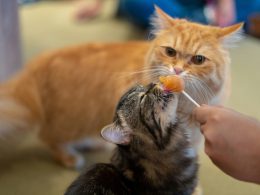Is your usually energetic pup suddenly turning up its nose at dinner? A dog’s lack of appetite can be significant since it can signal various issues, from a simple picky eater phase to a more serious underlying illness. Don’t wait to wonder if your dog is just being stubborn or if something more sinister is at play. Let’s dive into the question of “Why is my dog not earting” or “why your dog might be refusing their food” and what you can do about it.
Doggies may refuse to eat for various reasons:
Teething discomfort & Dental Issues: Like in Human, teething can be painful for dogs as well, who may be reluctant to eat if their mouths are sore. Dental problems in your dog’s mouth, such as gum disease or broken teeth, can make it painful for puppies to eat.
Upset stomach: Dogs can experience digestive upset for various reasons, such as eating something they shouldn’t have or a sudden change in diet. Sometimes people ask why is my dog’s stomach making noises and not eating, Well if your dogs stomach is making noises it could be a sign of disgestive issues.
Food allergies: Some dogs may be allergic to specific ingredients in their food, which can cause stomach upset, itching, and other symptoms.
Stress or anxiety: Your dog can experience stress, anxiety, stress (do they stress?) for various reasons, such as being separated from their littermates, moving to a new home, or being exposed to loud noises or other stressors.
Proven Tips to End Mealtime Frustrations
Maintain a regular feeding schedule: Puppies thrive on routine, so feeding them simultaneously daily helps regulate their appetite and makes mealtimes more predictable.
Create a calm and positive eating environment: Avoid distractions and make mealtimes a relaxed and enjoyable experience for your furry friend. Feed your dog in a quiet place where they will not be disturbed.
Offer a variety of high-quality dog food. Puppies have specific nutritional needs, so choose a food formulated for their age and activity level. Look for foods made with high-quality ingredients, and avoid artificial foods.
Use enticing toppers or mix-ins: A small amount of low-sodium chicken broth, peanut butter, or cottage cheese can make your dog’s food more appealing. You can also mix dry kibble with wet food to create a more flavorful meal.
Engage in interactive feeding games: Hide food around the house or use puzzle feeders to make mealtimes more fun and stimulating. This can help to encourage your dog to eat and prevent boredom.
Secret Strategies for Encouraging Your Dog to Eat
Warm up the food slightly: The aroma of warm food can be more enticing to puppies. Try warming up your dog’s food before feeding it to them.
Experiment with different bowl shapes and materials: Some puppies prefer shallow bowls, while others prefer stainless steel or ceramic bowls. Experiment with separate bowls to find what your dog likes.
Consider using a slow feeder bowl: This type of bowl can help prevent your dog, which can lead to digestive problems. Slow-feeder bowls are also a good option for puppies who are overweight or who tend to eat too quickly.
Be patient and consistent: Regularly getting your dog to eat may take time and effort. However, if you are patient and consistent with your feeding routine, eventually, your dog will learn to eat when you offer it a meal.
Common Mistakes You Should Avoid Feeding Your Dog
Overfeeding or underfeeding: Follow the feeding guidelines on your dog’s food bag and adjust as needed based on your dog’s weight and activity level. Overfeeding can cause weight gain and obesity while underfeeding can lead to malnutrition.
Changing food too frequently: Sudden changes in diet can upset your dog’s stomach and lead to digestive issues. If necessary, gradually change your dog’s food over several days.
Offering human food scraps: While occasional treats are okay, avoid giving your dog table scraps as they can be high in fat and calories. Human food can also contain harmful ingredients to puppies, such as onions, garlic, and chocolate.
Punishing your dog for not eating will make it more anxious and reluctant. If your dog is not eating, determine the cause and address it accordingly.
Ignoring signs of illness: If your dog has suddenly stopped eating, it could indicate an underlying health condition requiring veterinary attention.
The dog isn’t eating? Try Changing your Dog’s Food
To change your dog’s food, mix a small amount of the new food with the old food. Gradually increase the fresh food daily until your dog eats the new food exclusively. If your dog dislikes the new food, you can try another flavor or brand.
Raising a Happy and Healthy Dog
Proper nutrition is crucial for your dog’s growth and development. These tips and strategies can help your dog maintain a healthy appetite and enjoy a long, happy life. Consult your veterinarian for your furry friend’s nutrition and overall health.
Additional Tips for Picky Eaters and Puppies with Dental Issues
Mix dry kibble with wet food: This can make the food palatable for picky eaters.
Avoid feeding your dog dry foods that are too hard: These can be difficult for puppies to chew, especially if they have loose teeth or dental issues. Check your dog’s mouth regularly for any symptoms of dental problems, Such as broken teeth, excessive licking, or reluctance to eat. If you notice symptoms of dental issues, contact your veterinarian for an appointment.
Final Thoughts
Many dog parents face mealtime frustrations, but the right approach can overcome frustration. By understanding why doggies can be picky eaters and following the proven tips and secret strategies detailed in this guide, you can help your dog friend develop healthy eating habits and enjoy a long, happy life. Remember to consult your vet doctor for personalized advice and ensure no underlying health conditions affect your dog’s appetite.








